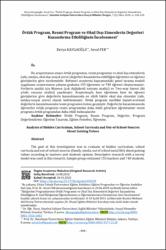| dc.contributor.author | Kavgaoğlu, Derya | |
| dc.contributor.author | Fer, Seval | |
| dc.date.accessioned | 2020-09-01T21:02:51Z | |
| dc.date.available | 2020-09-01T21:02:51Z | |
| dc.date.issued | 2020 | en_US |
| dc.identifier.issn | 2148-4287 | |
| dc.identifier.issn | 2148-7189 | |
| dc.identifier.uri | https://hdl.handle.net/11363/2385 | |
| dc.description.abstract | Bu araştırmanın amacı örtük programın, resmi programın ve okul dışı etmenlerin (aile, medya, okul dışı sosyal çevre) değerleri kazandırma etkililiğini öğretmen ve öğrenci görüşlerine göre incelemektir. Betimsel araştırma kapsamındaki genel tarama modeli uygulanan araştırmanın çalışma grubunu 155 öğretmen ve 740 öğrenci oluşturmuştur. Verilerin analizi için Manova (çok değişkenli varyans analizi) ve Two-way Anova (iki yönlü varyans analizi) yapılmıştır. Araştırmayla hem öğretmen hem de öğrenci görüşlerine göre değerlerin kazanılmasında en etkili faktör okul dışı etmenler (aile, medya-sosyal çevre) olarak belirlenmiştir. Örtük program özellikle kişisel-evrensel değerlerin kazanılmasında resmi programın önüne geçmiştir. Değerlerin kazanılmasında öğrenciler örtük programı resmi programdan daha etkili görürken öğretmenler resmi programı örtük programdan daha etkili bulmuşlardır. | en_US |
| dc.description.abstract | The goal of this investigation was to evaluate of hidden curriculum, school curricula and out-of-school-sources (family, media, out of school social life) about gaining values according to teachers and students opinion. Descriptive research with a survey model was used in this research. Sample group contained 155 teachers and 740 students. Multiple variable variance analysis (Manova) and two-way variance analysis (Two-way Anova) were used to analyze data. With this investigation, it was found by students and teachers opinion, out-of-school sources (family, media and social life) were the most effective factor about gaining values. Moreover, hidden curriculum was more effective than curricula especially gaining of personal-universal values. The findings showed that hidden curriculum was more effective than curricula according to students on the other hand, curricula was more effective than hidden curriculum according to teachers views. | en_US |
| dc.language.iso | tur | en_US |
| dc.publisher | İstanbul Gelişim Üniversitesi Yayınları / Istanbul Gelisim University Press | en_US |
| dc.relation.isversionof | https://dx.doi.org/10.17336/igusbd.450338 | en_US |
| dc.rights | info:eu-repo/semantics/openAccess | en_US |
| dc.rights | Attribution-NonCommercial-NoDerivs 3.0 United States | * |
| dc.rights.uri | http://creativecommons.org/licenses/by-nc-nd/3.0/us/ | * |
| dc.subject | Örtük Program | en_US |
| dc.subject | Resmi Program | en_US |
| dc.subject | Değerler | en_US |
| dc.subject | Program Değerlendirme | en_US |
| dc.subject | Öğretim Tasarımı | en_US |
| dc.subject | Eğitim Felsefesi | en_US |
| dc.subject | Öğrenme | en_US |
| dc.subject | Hidden Curriculum | en_US |
| dc.subject | Curricula | en_US |
| dc.subject | Values | en_US |
| dc.subject | Curriculum Evaluation | en_US |
| dc.subject | Instructional Design | en_US |
| dc.subject | Philosophy of Education | en_US |
| dc.subject | Learning | en_US |
| dc.title | Örtük Program, Resmi Program ve Okul Dışı Etmenlerin Değerleri Kazandırma Etkililiğinin İncelenmesi | en_US |
| dc.title.alternative | Analysis of Hidden Curriculum, School Curricula and Out-of-School-Sources About Gaining Values | en_US |
| dc.type | article | en_US |
| dc.relation.ispartof | İstanbul Gelişim Üniversitesi Sosyal Bilimler Dergisi | en_US |
| dc.department | İstanbul Gelişim Üniversitesi | en_US |
| dc.authorid | http://orcid.org/0000-0001-5926-3081 | en_US |
| dc.authorid | http://orcid.org/0000-0002-9577-2120 | en_US |
| dc.identifier.volume | 7 | en_US |
| dc.identifier.issue | 2 | en_US |
| dc.identifier.startpage | 404 | en_US |
| dc.identifier.endpage | 420 | en_US |
| dc.relation.publicationcategory | Makale - Ulusal Hakemli Dergi - Kurum Öğretim Elemanı | en_US |



















